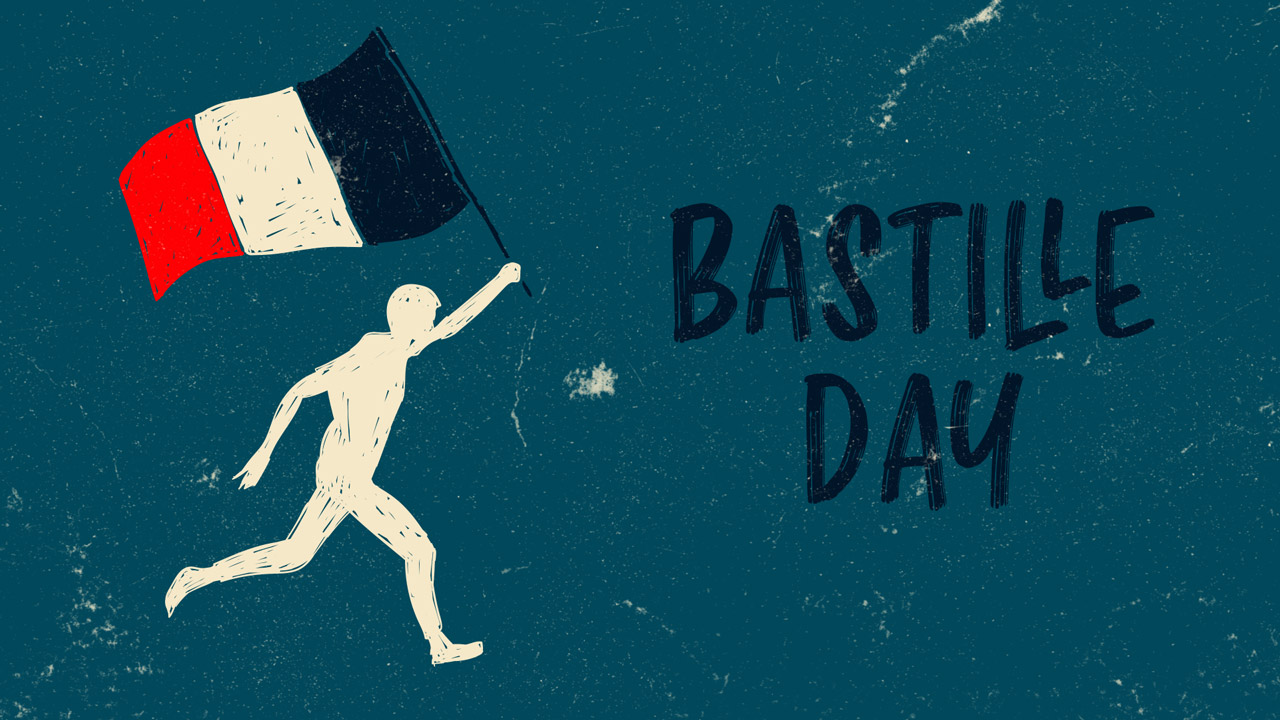Bastille Day: What You Need to Know About France’s National Day
Bastille Day, or la fête nationale (“the National Day”) as it’s known in France, takes place on July 14th. It marks the storming of the Bastille prison in 1789, a key moment in the French Revolution. National days like this are packed with history, culture, and useful vocabulary — which are always interesting for learners.
As a French graduate and a fluent speaker, I’ll give a brief history of France’s national day, followed by some traditions and cultural information surrounding it. As always, we’ll finish by covering some useful vocabulary around celebrations and national days.
Table of contents
Brief History of Bastille Day
Fed up with monarchy and the “Ancien Régime” (the Old Regime), the people of Paris took action. They poured into the streets and stormed the Bastille, an ancient fortress used as a prison by the French kings.
This historic moment took place on July 14, 1789 at the Bastille, which sparked the French Revolution. When the people seized the prison and released the prisoners, they secured their first victory against the monarchy. This was a significant moment, which later became France’s national day. Besides the Revolution, the storming of the Bastille was also the birth of a new era of liberté, égalité, fraternité (“liberty, equality, fraternity”), which is France’s slogan even today.
In the years that followed, July 14th became a national day of celebration and remembrance for the French people. It’s celebrated in Metropolitan France, as well as its 13 overseas departments territories such as French Guiana, Guadelupe, Martinique, and La Reunion.
Bastille Day Traditions and Celebrations
Bastille Day is a national holiday in France, which means that most businesses, schools, and government offices are closed. Celebrations are held in major streets of cities and town squares, with the most famous one being the défilé militaire du 14 juillet (“Bastille Day military parade”) in Paris.
Families and friends gather to watch the parade on TV, or simply enjoy the national day off. Throughout France, you can find fireworks, free entry to museums, concerts, and the traditional Bal des Pompiers (“Firemen’s Ball”).
Here is more information about the different Bastille Day celebrations:
Fireworks displays: From the grand spectacle in Paris to smaller shows in towns and villages, fireworks, or feu d’artifice are everywhere on Bastille Day.
Bal des Pompiers: Many fire stations throughout France open their doors to the public on the evening of July 13th for the traditional Firemen’s Ball. These lively events feature music, dancing, and food, as well as the chance to meet France’s brave firefighters.
Tricolore decorations: The French national flag is known as the Tricolore, which translates into “three colors.” As Bastille Day is France’s national day, this is a good opportunity for the country to display its flag. You’ll see it on buildings, streets, and public spaces.
La Marseillaise: By now, you know what you’ll see on Bastille Day, but what about what you’ll hear? The answer is the French national anthem, La Marseillaise. The national anthem starts like this: Allons enfant de la patrie, le jour de gloire est arrivé! (“Let’s go, children of the Fatherland, our day of glory has arrived!”)
Bastille Day in Paris and Other French Cities
As the capital of France, Paris hosts the country’s biggest défilé militaire (“military parade”) on Avenue des Champs-Élysées. This impressive display features thousands of soldiers, tanks, and armored vehicles marching down the famous avenue, accompanied by marching bands and flyovers by military aircraft. The French President, government officials, and foreign ambassadors always attend the event.
In addition to the military parade, Paris also hosts other events and activities throughout the day. Some museums, including the Louvre, offer free admission, allowing visitors to explore the city’s rich history and art scene. It’s important to note that the Louvre is closed on Tuesdays, so if Bastille Day falls on a Tuesday, the museum will be closed.
As night falls, the celebrations in Paris continue with a spectacular fireworks display centered around the Eiffel Tower. Thousands of people gather on the Champ de Mars, the park surrounding the tower, to witness the stunning pyrotechnics and light show. There’s a special show to see each year — in 2000, there was the Millenium, 2009 was the 120th anniversary of the Tower, and in 2024, Eiffel had a special edition for the Olympics, as they took place in Paris a couple of weeks after Bastille Day.
https://www.youtube.com/watch?v=O41AY0uZ5hU
Bastille Day Vocabulary in French
Now that you know what Bastille Day is about, it’s time to translate what we just talked about into French!
Here is a table covering Bastille Day vocabulary, along with some other festive words and phrases in
| English | French | Audio |
|---|---|---|
| “National day” | La fête nationale | |
| “Happy National Day!” | Bonne fête nationale ! | |
| “Long live France!” | Vive la France ! | |
| “July 14th” | Le quatorze juillet | |
| “The Bastille” (prison) | La Bastille | |
| “The French revolution” | La Révolution française | |
| “Liberty, equality, fraternity” | Liberté, égalité, fraternité | |
| “Military parade” | Le défilé militaire | |
| “To watch the parade” | Regarder le défilé | |
| “Fireworks” | Les feux d'artifice | |
| “To enjoy the fireworks” | Profiter des feux d'artifice | |
| “Firemen's Ball” | Le Bal des Pompiers | |
| “The French flag / Tricolore” | Le drapeau tricolore | |
| “La Marseillaise” (the French national anthem) | La Marseillaise | |
| “Public holiday” | Jour férié | |
| “Celebration, festival” | La fête | |
| “Crowd” | La foule | |
| “Event” | L'événement | |
| “Ceremony” | La cérémonie |
Vive la France!
If your visit to France falls on Bastille Day, look for a Bal de Pompiers, watch the fireworks at the city center, or enjoy a free entry to the Louvre. Learning about its national day is an important part of learning the language, so add it to your list along with tasting the delicious French food and learning the basics of the language.
To take your French to the next level, make sure to check our other French learning resources!









Social